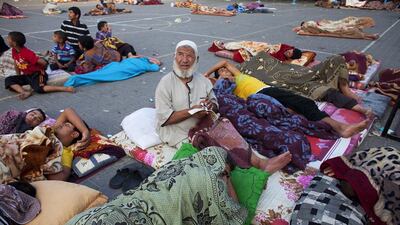GAZA CITY // The top Hamas leader in the Gaza Strip says the aim of his group’s current battle with Israel is to force an end to the blockade of the territory.
Ismail Haniyeh’s comments indicate that Hamas will continue to reject an unconditional cease-fire proposed by Egypt last week.
Israel and Egypt imposed the closure in 2007, after Hamas took over Gaza from the Western-backed Palestinian authority.
Mr Haniyeh said in a televised speech Monday that “we cannot go back, we cannot go back to the silent death” of the blockade.
He says “Gaza has decided to end the blockade by its blood and by its courage.”
Speaking from Qatar, Palestinian president Mahmoud Abbas and Hamas leader Khaled Meshaal, who resides in Doha, issued a joint appeal for an end to “Israeli aggression” in Gaza following talks on Monday.
Meeting for the first time since the start of the Israeli assault on Gaza on July 8, the two men also called for Israel to lift its blockade.
They “underlined the necessity of an end to the Israeli aggression and a lifting of the blockade”, chief Palestinian negotiator Saeb Erakat said.
He said the two men also “decided to hold further consultations with different Palestinian factions and contacts” on ceasefire efforts.
Azzam Al Ahmed, a senior official in Mr Abbas’s Fatah party, is to travel to Egypt, which last week proposed a ceasefire plan supported by the Arab League but rejected by Hamas, Mr Erakat said.
UN chief Ban Ki-moon arrived on Monday in Cairo, where United States secretary of state John Kerry was also due later the day, as international efforts to secure a ceasefire gathered pace.
Hamas has demanded the release of scores of prisoners from Israeli jails, the reopening of the Rafah border crossing with Egypt and an end to Israel’s blockade of Gaza.
“These are not conditions but engagements that Israel must honour,” Mr Erakat said.
Mr Kerry is to push for an “immediate” ceasefire in Gaza when he arrives in Cairo, US president Barack Obama said in a speech on Monday.
Voicing fresh concern about civilian casualties, Mr Obama reaffirmed his belief that Israel has the right to defend itself against rockets being launched by Hamas into Israel. Yet he contended that Israel’s military action in Gaza had already done “significant damage” to the Hamas terrorist infrastructure and said he doesn’t want to see more civilians getting killed.
“We have serious concerns about the rising number of Palestinian civilian deaths and the loss of Israeli lives,” Mr Obama said. “And that is why it now has to be our focus and the focus of the international community to bring about a ceasefire that ends the fighting and can stop the deaths of innocent civilians, both in Gaza and in Israel.”
As Mr Obama spoke from South Lawn of the White House, Mr Kerry was already flying to Cairo, where he planned to join diplomatic efforts to resume a truce that had been agreed to in November 2012. He will urge the militant Palestinian group to accept a ceasefire agreement offered by Egypt that would halt nearly two weeks of fighting. More than 500 Palestinians and 20 Israelis have been killed in that time.
The Obama administration, including Mr Kerry, is sharpening its criticism of Hamas for its rocket attacks on Israel and other provocative acts, like tunnelling under the border. It is also toning down an earlier rebuke of Israel for attacks on the Gaza Strip that have killed civilians, including children.
In a statement Sunday evening, State Department spokeswoman Jen Psaki said the US and international partners were “deeply concerned about the risk of further escalation, and the loss of more innocent life.”
Two Americans, Max Steinberg of California and Nissim Carmeli of Texas, who fought for the Israel Defense Forces were killed in fighting in the Gaza Strip. The State Department confirmed the names of the two US citizens on Sunday night.
Cairo’s ceasefire plan is backed by the US and Israel. But Hamas has rejected the Egyptian plan and is relying on governments in Qatar and Turkey for an alternative proposal. Qatar and Turkey have ties to the Muslim Brotherhood, which is also linked to Hamas but banned in Egypt.
Three Egyptian officials said Cairo might be willing to amend its truce initiative to end the fighting in Gaza to accommodate Hamas.
“Egypt does not mind adding some of Hamas’ conditions provided that all involved parties approve,” one senior Egyptian official said, without giving details.
Among Hamas’s conditions are the lifting of the Israeli and Egyptian blockade on Gaza and the release of several hundred Palestinians arrested by Israel last month during its search for three Jewish teenagers abducted in the occupied West Bank. The trio were later found dead in a killing Israel blamed on Hamas.
* Agence France-Presse, Reuters, and Associated Press

